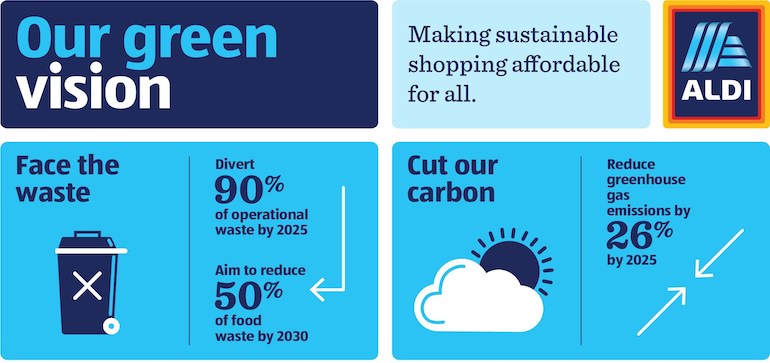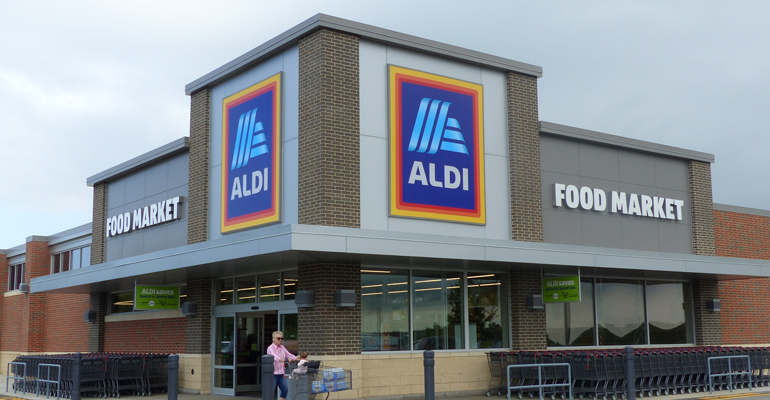Hard discount grocer Aldi has enacted a new sustainability charter to lower emission of greenhouse gases, cut food and operational waste, improve packaging and source responsibly — while maintaining accessible and affordable food and grocery options for customers — through 2030.
Greater use of renewable energy headlines an effort to reduce greenhouse gas emissions 26% by 2025. To that end, Batavia, Ill.-based Aldi U.S. said Wednesday it plans to continue a transition to solar and wind energy sourcing and bolster its renewable infrastructure to reduce reliance on gray power grids. Currently, Aldi has solar panels at 111 stores and 12 distribution centers across the country and aims to add solar energy to warehouses in Alabama and Kansas and to about 60 stores by the end of 2022.
The retailer noted that it has been recognized by the Environmental Protection Agency as a “green” power leader, and it now buys enough renewable energy each year to support its more than 2,000 stores in 37 states, 25 warehouses and offices. The power is being sourced via Green-e, and the company receives renewable energy certificates to validate its clean energy investment.
Also to help lower emissions, Aldi U.S. warehouses and almost 400 stores use natural refrigerants that reduce the environmental impact by up to 4,000 times versus common refrigerants. Plans call for a continued shift to natural refrigerants at all stores, the company said, adding that in 2020 it earned more EPA GreenChill store certifications than any supermarket chain previously, all at the platinum level.
“Aldi has a responsibility to protect the environment, and we know it’s an important priority for our customers,” Aldi U.S. Jason Hart said in a statement on the new sustainability charter. “We are committed to evaluating and implementing sustainable business practices while always offering the highest-quality products at prices that can’t be beat.”

In the area of waste reduction, Aldi has set targets to divert 90% of its operational waste by 2025 and halve its total food waste by 2030. The grocery chain said it’s still developing its waste reduction plans, but efforts are slated to include composting, nonfood donation programs, and increased recycling and food recovery.
Aldi reported that it already diverts waste from stores and warehouses and has recycling processes for food, plastic film, corrugated cardboard, paper, metals and other materials. Last year, the company recycled approximately 300,000 tons of material, the greenhouse gas emission equivalent of nearly 9 million gallons of gasoline monthly. Aldi also donated over 29 million pounds of product to Feeding America food banks that otherwise would have ended up in landfills.
Recycling efforts, too, are a linchpin of Aldi’s efforts in waste reduction and shrinking its environmental footprint. The company has set a goal to cut down on packaging materials by 15% and convert all Aldi-exclusive packaging to reusable, recyclable or compostable materials by 2025. More than 90% of the products sold at Aldi stores are exclusive items, the retailer said.
Among recycling and packaging initiatives, Aldi plans to remove Styrofoam from all produce packaging by the end of 2021 and transition all exclusive packaging — including plastic — to reusable, recyclable or compostable material by 2025. So far, the company said it has redesigned packaging to remove or reduce excess plastic from products such as tea and bread. Some stores also have begun using alternative packaging for perishables, such as for blueberries and tomatoes (20% less plastic than traditional containers) and mixed bell peppers (44% less plastic).

Products also are being labeled to promote recycling at home, such as through the use of cardboard sleeves for more than 90% of apparel items and testing of recyclable and compostable paper bags for apples in some stores.
Aldi noted that it has never offered single-use plastic shopping bags at checkout and only sells reusable plastic and cloth bags, which it estimates has kept more than 15 billion bags out of landfills and oceans. The retailer said it’s also piloting removal of all multi-use plastic bags at six stores in Richmond, Va.
“The global impact of plastics can’t be ignored,” according to Hart. “We can’t get rid of plastic everywhere overnight, but we continue to work to eliminate plastics anywhere we can. Where we do need plastic, we are committed to choosing materials that contribute to a circular plastic economy.”
On the supply-chain front, Aldi is working to expand sustainable sourcing of coffee and continue responsible sourcing of cocoa and seafood sustainably. In tandem with business partners, the company said it will promote human rights, enhance supply chain transparency and ensure products are designed and made in an eco-friendly manner.
More than 40 Aldi coffee products are certified as sustainable, and the chain said it’s the second-largest private-label purchaser of Fair Trade USA coffee. All Barissimo- and Simply Nature-brand coffee products are due tol be certified as sustainably sourced by the end of 2022. All Aldi exclusive-brand chocolate bars and chocolate confections are certified as sustainably sourced by Fairtrade, Fair Trade USA or Rainforest Alliance.
Similarly, all Aldi exclusive-brand fresh, frozen and canned seafood is sourced from responsible fisheries and farms, and 100 seafood products are certified as sustainably sourced by a third party. The retailer, too, said it also has made the origin of its wild-caught seafood brand transparent and publicly available via the Ocean Disclosure Project.





